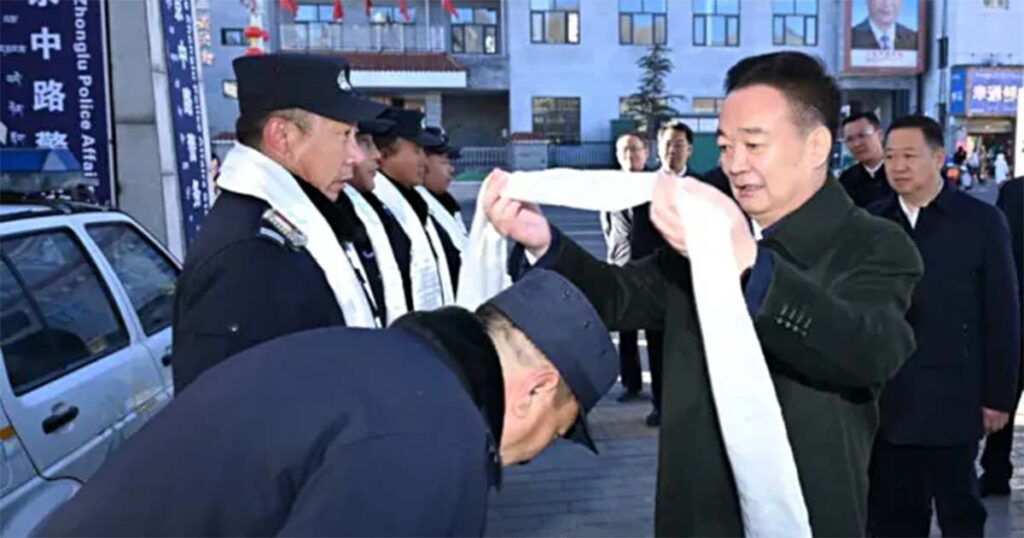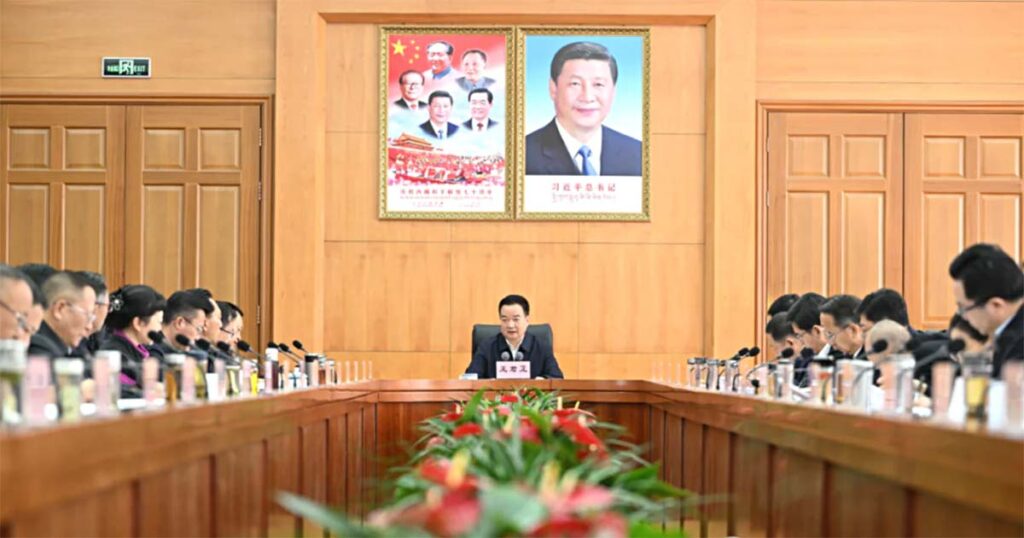
A Communist Party Secretary awards police officers with Tibetan Khatas.
An important anniversary for the rule of the Chinese Communist Party in Tibet is looming. September 1st marks the 60th anniversary of the dismemberment of Tibet under the Chinese occupying forces. This was recently pointed out by Communist Party Secretary Wang Junzheng, the highest-ranking Chinese official in Tibet’s capital, according to Chinese propaganda media reports.
At a meeting of the regional party committee, Wang gave instructions for “political and legal work”. On this occasion, Beijing’s man in Lhasa repeatedly referred to the upcoming 60th anniversary of the founding of the so-called Tibet Autonomous Region (TAR) on September 1, 1965.
This marked the completion of the administrative reorganization of the country by the Chinese rulers. However, the TAR only covered about half the country. The other half of Tibet – and thus also its inhabitants – were largely assigned to the Chinese provinces of Qinghai, Gansu, Sichuan and Yunnan as so-called “Tibetan Autonomous” counties and prefectures.
Wang Junzheng called on the assembled Communist Party officials to welcome and support the 60th anniversary of the TAR. As always on such occasions, the Communist Party Secretary did not fail to point out “the important instructions of General Secretary Xi Jinping” at the beginning of his speech. This obviously compulsory exercise is one that no Communist Party representative can miss.
It is also not surprising how often Wang used the term “constitutional state”. After all, it has always been good form in a communist dictatorship to describe one’s own unjust state with false claims that sound high-minded.
United Labor Front: Instrument of Power of the Communist Party
Recently, Wang Junzheng attended a meeting of the regional united front work department of the Communist Party. This department is responsible for the Communist Party’s influence operations at home and abroad. Particularly important in the context of Tibet: The united front is responsible, among other things, for the Chinese Communist Party’s religious policy.
At this meeting, Wang Junzheng began his speech by reiterating his praise for the “important ideas of General Secretary Xi Jinping,” which should be thoroughly studied and implemented. Wang urged his audience to work towards the establishment of a “new, socialist and modernized Tibet.”

Under the watchful eye of Communist Party leader Xi Jinping, Communist Party Secretary Wang Junzheng speaks to representatives of the Communist Party’s United Front Department. (Source: tibet.cn)
An important instrument used by the Chinese rulers to achieve this is the forced assimilation of Tibetans with the aim of eradicating their independent culture, tradition and language. The ideological phraseology of the Communist Party then speaks of “building the Chinese national community as the main line”.
The aim is also to promote “the spread of the common national language and writing system” – this means that as far as possible all communication takes place in Chinese and in Chinese script.
Wang’s list also includes a reference to the desired “Sinicization” of Tibetan Buddhism. It is important to actively guide Tibetan Buddhism to “be compatible with socialist society,” said the Communist Party secretary.
Tibetan blessing scarves from the hand of the Communist Party secretary
A surprising image was included in another report by the Chinese propaganda media. During a visit by Communist Party Secretary Wang Junzheng to a police station in Tibet’s capital Lhasa, where he honored police officers and cleaners. Instead of handing out medals or gifts, as is customary in China, the Chinese Communist Party Secretary puts traditional Tibetan scarves known as khatas around the men’s necks.
The Tibetan scarves symbolizing auspiciousness, lucky and blessing are deeply rooted in Tibet’s spiritual tradition. In the picture we see the highest representative of the Chinese occupying power handing out khatas to police officers – representatives of an institution that has a monopoly on violence in Tibet and thus ensures the forced assimilation of Tibetans.
While the Chinese Communist Party state is openly trying to transform the Tibetans into Chinese, to erase or appropriate their culture by taking an important symbol of their tradition to identify those who, when necessary, will enforce it by force.
This incident is permeated with deep irony and illustrates another facet of China’s new cultural revolution in Tibet.
